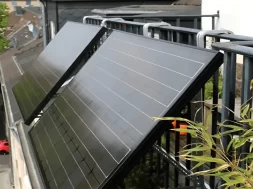
Georgia Power wants to own and operate 80MW of battery ESS to ‘maximise value of renewables’
Utility Georgia Power wants to own and operate 80MW of battery energy storage systems in its service area, building on the state’s early recent steps to investigate the value of storage both in front of and behind the electricity meter.
Georgia Power has just made a request to raise residential rates in order to invest in the state’s “energy future” by 7% next year, filed with the Georgia Public Service Commission (PSC). In doing so, the utility said it has already spent or committed “nearly US$18 billion… to strengthen the reliability and resiliency of the state’s electrical system and to comply with federal regulations”.
Environmental compliance plans, air and water quality issues, as well as extensive storm restoration efforts are all drivers for this investment, while the company is like other utilities, trying to create smarter energy plans for its customers, Georgia Power said. Its 2.6 million customers currently pay 16% below the national average for power and residential rates have actually fallen slightly since 2011, the company argued.
“The company will continue to invest in a diverse mix of energy resources, including renewable energy,” the release said, adding that Georgia Power has 1,500MW of renewable resources online and around the same amount again under development (+1600MW).
Georgia Power’s 2019 Integrated Resource Plan (IRP) spells out plans to have more than 4,750MW of renewable energy resources in its portfolio by the end of 2024, if approved by the PSC. According to the utility, battery energy storage systems (BESS) are “critical to maximising the value of renewable energy resources”.
“The company seeks this opportunity to demonstrate the deployment, integration, operation and grid optimisation of storage to gain valuable insight into how to maximise the value of storage for customers,” Georgia Power said, with the PSC expected to vote on the IRP plan on 16 July 2019.
The state, its utilities and other entities have so far made just small steps to investigate the value of energy storage: in December 2014, Energy-Storage.news reported that the non-profit Electric Power Research Institute (EPRI) was testing and evaluating a battery system paired with a 1MW solar array, then more recently in early 2018 Georgia Power helped create a net zero energy home solution with homebuilding company PulteGroup in a ‘smart neighbourhood’ using solar-plus-storage systems. In January 2019, we reported as local solar installer Creative Solar USA started up a community ‘bulk buy’ solar programme which included AC-coupled lithium-ion battery energy storage systems from Eguana Technologies in the solutions offered at an initial couple of dozen household sites.















